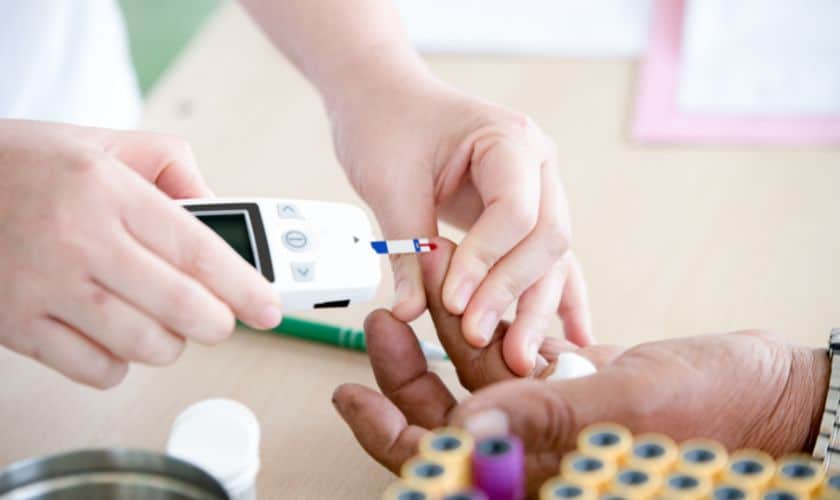Are you a diabetes patient trying to maintain your eye health? Do you know that uncontrolled blood sugar levels can cause diabetic retinopathy and other eye complications? The eyes are sensitive organs, and taking care of them is just as crucial as managing your blood sugar levels. In this post, we’ll be sharing seven important eye health tips for diabetes patients. Stick around to the end so that you don’t miss out on any valuable information!
Tips for Diabetes Patients About Their Eye Health
According to the American Diabetes Association, more than 29 million people in the United States have diabetes. It is estimated that one in four of them don’t even know it. Diabetes is the leading cause of blindness in adults aged 20 to 74. Diabetic retinopathy is damage to the retina caused by changes in blood sugar levels. Over time, diabetic retinopathy can lead to vision loss and even blindness. Therefore, it’s important to treat your diabetic retinopathy to avoid any further complications.
Here are some tips for people with diabetes about their eye health:
1. Comprehensive Eye Examination
Have a comprehensive dilated eye exam at least once a year. A comprehensive dilated eye exam is the best way to detect diabetic retinopathy in its early stages before it causes vision loss. During this exam, your doctor will dilate (enlarge) your pupils and examine your retina for signs of disease.
2. Monitor Blood Sugar Level
Keep your blood sugar levels under control. High blood sugar levels contribute to the development and progression of diabetic retinopathy. By keeping your blood sugar levels as close to normal as possible, you can help slow the progression of the disease and prevent vision loss.
3. Eat a healthy diet with lots of fruits and vegetables
A healthy diet is important for everyone, but it’s especially important for people with diabetes. That’s because diabetes can cause changes in your eyes that can lead to vision problems and even blindness.
One way you can help keep your eyes healthy is by eating a diet that’s rich in fruits and vegetables. Fruits and vegetables are good for your overall health and can also help protect your eyes. For example, research has shown that people who eat a diet that’s rich in antioxidants, like those found in many fruits and vegetables, have a lower risk of developing cataracts.
Another benefit of eating lots of fruits and vegetables is that they can help you control your blood sugar levels. That’s important because high blood sugar levels are one of the main risk factors for diabetic retinopathy, a serious eye condition that can cause vision loss.
So make sure to eat plenty of fruits and vegetables every day. And if you have trouble getting them into your diet, there are supplements you can take that contain antioxidants and other nutrients that are good for your eyesight.
4. Avoid smoking
It is a well-known fact that smoking is bad for your health. But did you know that it is especially harmful to those with diabetes? Studies have shown that smokers are two to four times more likely to develop diabetic retinopathy, which can lead to blindness. That’s why it’s so important for smokers with diabetes to quit. If you’re having trouble quitting, talk to your doctor about cessation aids such as nicotine replacement therapy or prescription medications.
5. Manage stress
According to the American Diabetes Association, stress is a common trigger for short-term spikes in blood sugar levels. So, it’s important for diabetes patients to find healthy ways to manage stress. Some tips for managing stress include:
Identifying and avoiding your triggers
What situations or activities tend to make you feel stressed? Once you know your triggers, try to avoid them or plan ahead so you’re better equipped to deal with them.
Exercise
Exercise is a great way to reduce stress. Not only does it help your body physically, but it also releases endorphins, which have mood-boosting effects.
Relaxation techniques
There are many different relaxation techniques that can help reduce stress, such as deep breathing, yoga, or meditation. Find one that works for you and make it part of your daily routine.
Talking to someone
Sometimes just talking about what’s stressing you out can help relieve some of the tension. Talk to a friend, family member, therapist, or any other support system you have.
Stay hydrated
One of the most important things you can do to protect your vision if you have diabetes is to keep your blood sugar levels under control. But another crucial element of maintaining good eye health is staying hydrated.
Diabetes can cause dehydration because it causes your body to excrete more water than normal. When you’re dehydrated, your eyes can become dry and irritated. This can lead to a condition called diabetic keratopathy, which is a major cause of blindness in people with diabetes.
That’s why drinking plenty of fluids and avoiding dehydration is so important. The best fluids to drink are water and unsweetened fruit juices. You should also avoid alcohol and caffeinated beverages, which can dehydrate you.
If you feel thirsty, drink immediately. Don’t wait until you’re thirsty to drink fluids – by then, you may already be dehydrated. And be sure to urinate frequently; if your urine is dark yellow, that’s a sign that you need to drink more fluids.
The Bottom Line
Diabetes patients need to take special care of their eyes as a diabetes-induced eye condition can affect vision and lead to more serious complications. We hope that our 7 crucial tips for eye health have given you the necessary advice on how to protect your eyes from any damage caused by diabetes. Proper nutrition, regular exercise, blood sugar level monitoring, and scheduling routine visits with your optometrist are just some of the ways you can ensure healthy vision even in the face of this disease.
Diabetes can lead to a number of eye complications, including diabetic retinopathy and glaucoma. These conditions are caused by long-term damage to the blood vessels in the retina (the back part of the eye) that can be caused by high levels of sugar concentration in the blood and fluid buildup in the eye due to diabetes. Diabetics should have an annual dilated eye exam from an optometrist or ophthalmologist, which is crucial for maintaining proper vision health.
Diabetes can have a significant effect on the eyes, and can even lead to vision loss or blindness. Common problems caused by diabetes include glaucoma, cataract, diplopia (double vision), blurred vision, retinal damage, and macular degeneration. Early detection and proper management of your diabetes are paramount in preventing these eye problems from occurring.


